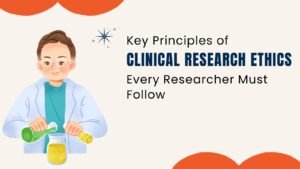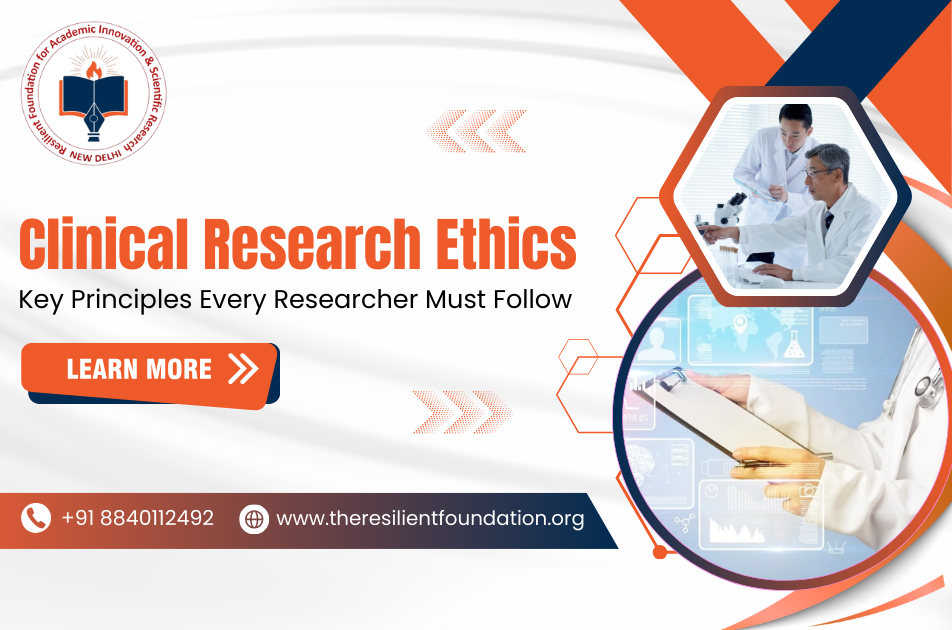When we talk about clinical research ethics, we mean the rules that guide research on humans. These rules ensure participants are safe, respected, and treated fairly. Research is growing fast today, but without strong ethical rules, it can cause harm. That is why ethics in science is not optional; it is a must for every researcher. If someone plans to join a research workshop or focus on research and development, they must learn these ethics. Many institutes provide a bioethics training program and research ethics certification to guide them.
Why Following Clinical Research Ethics is Essential?
There are strong reasons why following clinical research ethics is so important. Every researcher must keep these in mind:
- Protecting Participants: Ethics in science makes sure that people who take part in studies are safe and informed about what will happen.
- Building Trust: If researchers follow rules, people trust them more, which helps future studies.
- Improving Quality: Ethical research means honest data, and honest data means better results in research and development.
- Legal Safety: Many countries require research ethics certification for approvals, so following rules keeps projects safe from legal issues.
- Future Growth: With the right bioethics training program, researchers not only learn rules but also improve their career value.
Key Principles of Clinical Research Ethics Every Researcher Must Follow
If you are working in a research workshop or planning a project, these are the main principles to guide you:

- Respect for People: Every person must be treated with dignity, and their consent must be taken before any study.
- Beneficence: The goal is to do good, so researchers must work to bring benefits and reduce harm.
- Justice: Fairness in choosing participants is a key part of clinical research ethics.
- Transparency: Results should be shared openly, without hiding mistakes, because ethics in science demands honesty.
- Confidentiality: Keeping personal data safe is very important in modern research and development.
- Training & Certification: Taking part in a bioethics training program or getting research ethics certification makes these rules clearer.
Core Areas Covered Under Clinical Research Ethics
When you study clinical research ethics, you learn about different areas that matter in real practice. Some of these include:

- Informed Consent: Making sure every participant knows what the research is about before saying yes.
- Risk vs. Benefit: Always checking if the good outcomes are more than the possible harm.
- Privacy & Data Safety: Protecting people’s personal information is one of the strongest parts of ethics in science.
- Cultural Sensitivity: Understanding people’s beliefs, traditions, and values before starting research.
- Training Programs: A bioethics training program and research ethics certification help cover these areas in detail.
- Practical Learning: Joining a research workshop is also a good way to apply these principles in research and development.
Common Ethical Challenges in Clinical Research
Even with clear rules, challenges often come up. Some of the common ones are:
- Lack of Consent: Sometimes, people are not told clearly about risks, which is against clinical research ethics.
- Pressure on Participants: If people feel forced to join, it breaks the basic rules of ethics in science.
- Conflict of Interest: If a researcher is more focused on money than results, ethics are ignored.
- Data Misuse: Using data for other purposes without permission can harm both research and participants.
- Poor Training: Without a bioethics training program or research ethics certification, mistakes in research and development can happen.
- Ignoring Rules in Workshops: Some research workshop settings may skip key checks, which can be risky.
Best Practices for Researchers to Ensure Ethical Compliance
To avoid mistakes and stay true to clinical research ethics, researchers should follow some best practices:
- Always Get Training: Enrol in a bioethics training program or complete a research ethics certification to build a strong base.
- Join Expert Workshops: Attending a research workshop organised by trusted groups helps in learning practical rules.
- Focus on Development with Care: While working in research and development, never put results above people’s safety.
- Work with Transparency: Keep all records clear and be open to questions. This builds trust in ethics in science.
- Stay Updated: Rules change often, so researchers should keep learning.
At Resilient Foundation, we provide guidance and training programs for people who want to improve their knowledge in research ethics. By supporting programs, workshops, and awareness drives, we make sure that researchers always follow the right path. Our goal is to build a safer, fairer, and more responsible future in clinical research.

